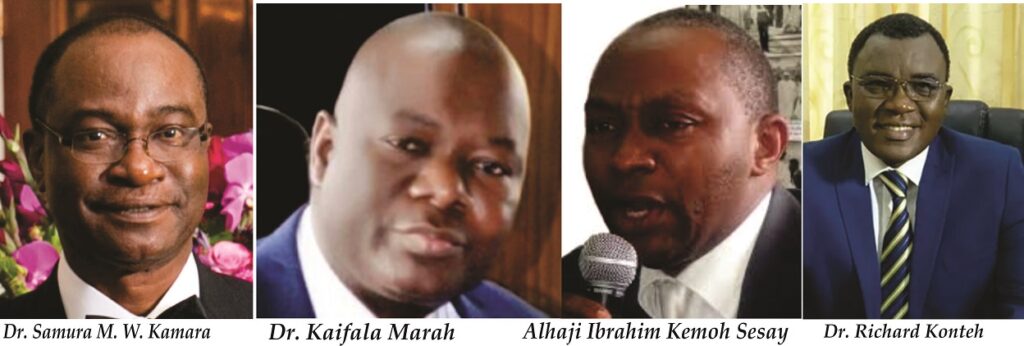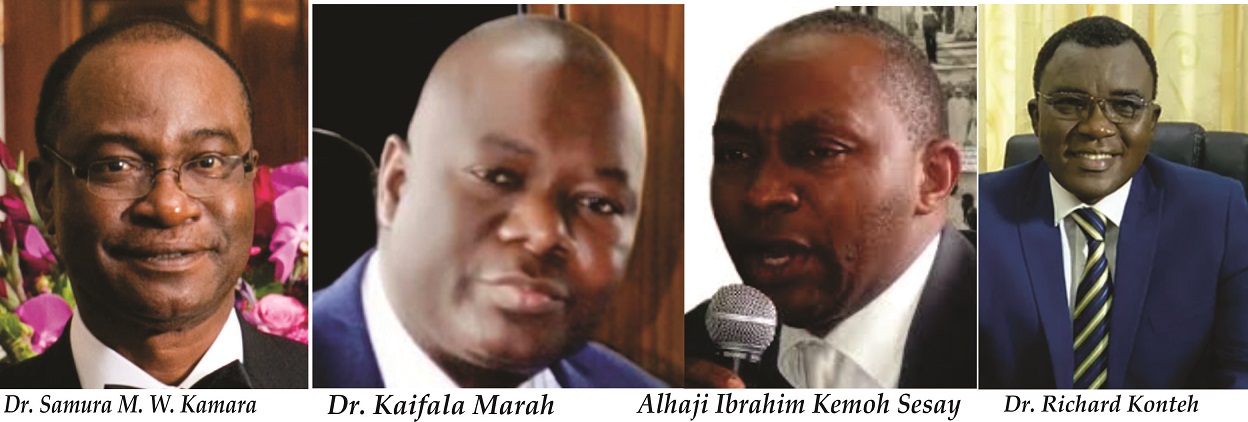It is better to be a prisoner behind bars than to be prisoners of daylight. A daylight prisoner enjoys some latitude of freedom, but it is a mickey-mouse freedom.
This is the exact situation ex-government officials have been trapped since they left power in 2018 as a result of corruption allegations. The travelling papers of those ministers and heads of key agencies who served former President Ernest Bai Koroma have for a long time been in the hands of government.
It is not clear whether those papers have been returned to the former officials. As long as these papers remain in the hands of government, no ex-government official leaves the country without recourse to government.
They must obtain permission from the police chief and the Attorney—General and Minister of Justice for them to go across national borders. It is compulsory for any ex-minister wishing to leave the country to make it known to the two government officials.
Ex-minister of Information and Communication, Alpha Khan was the first victim of government’s travelling ban. Khan who attempted to go out of Sierra Leone for medical treatment got stuck at a roadblock in the northern district of Kambia.
The ex-minister would have left Sierra Leone via the Republic of Guinea had he got the free passage. It was clear that he did not inform the appropriate officials, and thus could not move out.
Khan had no alternative but to get on to the authorities in Freetown. It was not clear whether he was permitted to go out. What was clear, Khan was returned to his hometown of PortLoko by security officials at the border post.
The former Minister’s situation was sad and perilous. It brought about a moment of horrible reflection since a man whose authority was felt in the entire country years back could not go through a tiny police checkpoint manned by police officers who are hitherto subordinates of the ex-minister.
The answer boils down to not only a question of change of power but also a question of political harassment and intimidation of those who kept the state purse for 11 years.
Khan’s humiliation at the checkpoint signalled a genesis of a continued intimidation in coming months if not years. This situation left the ex-minister figuring out what to do next. Little wonders that Alpha Khan had cause to join ranks with SLPP to be on the safe side. Former Vice President too, Victor Bockarie Foh has followed suit. The former Vice President was, before this time, an object of corruption trial in the high court of Sierra Leone.
The allegedly corrupt official narrowly escaped imprisonment leaving him with no choice but to succumb to a fate similar to Khan’s.
Foh who was a strong opponent to a Bio’s presidency in 2012 could now praise him for his good governance although there is some element of hypocrisy. The former Vice President now accompanies President Bio on most of his important tours with a cloak of indebtedness.
It is clear that Foh’s conversion into SLPP is to free himself from the legal albatross around his neck. He does not want to become a prisoner of daylight.

It goes without saying that the former minister is not alone in the blockade, other ministers are trapped too. The ban came immediately SLPP (Sierra Leone People’s Party) government came to power in 2018.
Government’s allegation holds that the former government officials wanted to stash away stolen money and assets for which they must be investigated.
The mickey-mouse freedom of the former authorities was worsened following the publication of a list of those who should not travel. Government, to a large extent, was biased: The names of Ministers of south-eastern background were conspicuously absent there although they served a government SLPP said was corrupt.
The name of former Minister Lands and Country Planning, Denis Sandy was not included in the list although he was a key minister in the Koroma-led administration.
Sandy was also Minister of Lands in the past government.
Freedom of the ex-ministers was not only curtailed, but also had their assets frozen. They have lost money in their accounts owing to the asset freeze. They could not move out of the country, and also do not have access to their resources. In such a situation, how can the former ministers survive? This press is aware of a minister who cannot bring his money home in Sierra Leone because he has no chance to do so.
By his looks, the minister has always wanted to invest his money to create jobs for the young men and women of Sierra Leone, but could not do so owing to the fear of reprisals.
The bias displayed by government was a key factor to the resistance put up by former government officials. The resistance could not be sustained as government possessed the sword to ensure that the officials comply.
The daylight-prisoner phenomenon was brought about a GTT (Governance Transition Team) report authored by SLPP hardliners led by the former Chief Minister, Professor David Francis who now sits as Minister of Foreign Affairs and International Cooperation.
In his report, Prof Francis bluntly tagged the former government as “a criminal racketeering enterprises.”
In plain terms, the officials are thieves beyond description, and their actions led to a huge debt burden. The report cited billions of dollars as external debts while Trillion of Leones went into domestic debt.
The high debt burden, the report says, was fuelled and nourished by the corruption of the past government. The huge debt brought about adverse recommendations and one of them is the setting up of commissions of inquiry to look into how state coffers were handled. Nobody says the move is illegal. Sierra Leoneans are not averse to a commission of inquiry that go after corrupt government officials but they are concerned with the procedures used to set up the investigative body.
The judge-led commissions’ existence was never in compliance with legally accepted procedures. Section 150 which provides for rules of evidence was ‘nakedly’ circumvented.
The said provision obliges the Rules of Court Committee to come up with rules that regulate the practice and procedures of all commissions of inquiry.
Head of the judiciary, the Chief Justice chairs the rules committee.
These rules never came from start to finish of the commissions’ investigations although defence lawyers for persons of interest persistently made strong arguments in favour of the rules.
The jurisdiction of the commissions of inquiry was also challenged. The three instruments on which the formation of the commissions was based were erroneous, defence lawyers say. As a result, the commissions lack the power to deliver on their mandate.
These arguments were ignored by the lead commissioner, Justice Biobele Georgewill who appeared ambitious to see an investigation of the former government.
Left with no option, a key defence lawyer referred the question of the commissions’ legality to the country’s highest court, the Supreme Court. To date, it is not yet clear whether a ruling has been handed down.
It was in the face of such errors and objections that the commissions operated resulting into harsh decisions that continue hit hard the former ministers.
Without rules, the commissions are rudderless. They are also illegal, and an illegal institution could not make recommendations that are legal. This means government ought not to have enforced the recommendations since the commissions are “Kangaroo-styled,” says erstwhile Publicity secretary, Cornelius Deveaux who seeks an asylum elsewhere.
He too is a daylight prisoner outside his home.


